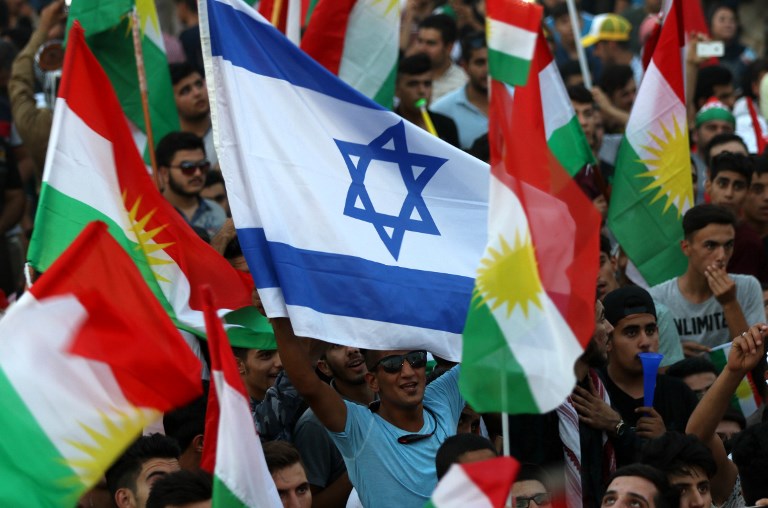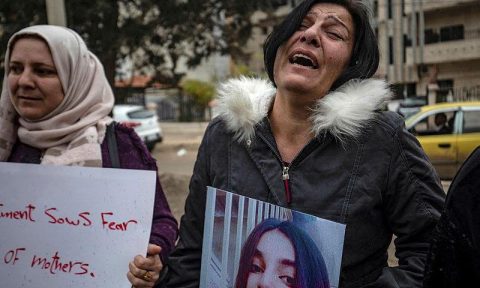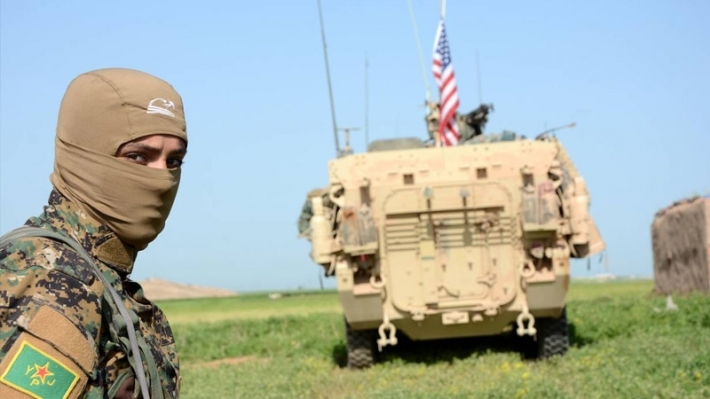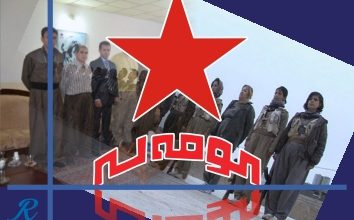Massoud Barzani’s legacy, the referendum for independence in Iraqi Kurdistan of three years ago, drew the ire of all its neighbors, including the central government in Baghdad. Opposition to his actions have had catastrophic results for the autonomous region, as it provoked the Iraqi government to invade the province of Kerkuk and is often quoted as the reason behind bad blood and following budget issues with the central government.
Yet, as the world protested Barzani’s bold move, the Israeli government of Benjamin Netanyahu was cheering this step. A stance that reflected decades of quiet relations between Israel and Erbil, that started decades ago, as described earlier in the article ‘Ben Gurion’s Periphery doctrine and Kurdish seperatism’. This might have even triggered the Kurds into a false sense of security, who expected words to turn into actions, and Israel to help out when facing opposition.
Israel celebrated the outcome of the referendum held on September 25th, 2017, in which an overwhelming majority of the Iraqi Kurds voted for breaking away from Baghdad. As the Iraqi Kurds cast the ballots, Israeli citizens were celebrating in the streets, and Israeli flags were waved all across the Kurdish region.
In this article, I discuss the history and diplomatic impact of Israeli-Kurdish ties, the reasoning behind Israel’s support, and what Israel’s support for the referendum has meant for Kurds in the region.
Israeli support
Since the expansion of ISIS in the summer of 2014, Israeli leaders have publically proclaimed the Kurds’ right to an independent state in Iraqi Kurdistan. Those leaders have included former president Shimon Peres, Prime Minister Benjamin Netanyahu, and Foreign Minister (now Defense Minister) Avigdor Lieberman. Netanyahu has all but cheered for the move that provoked harsh international reactions. The leaders of northern Iraq’s Kurdistan Regional Government, or KRG, were happy to receive the Israeli support, as they sought to grab independence before Washington backing out of Iraq. Kurdish leaders, however, could not openly celebrate Israeli encouragement for fear of repercussions from their neighbors, who often – and not unrightfully – link aspirations for Kurdish independence with Zionism.
Israeli-Kurdish ties go back a long way. First minister Ben Gurion developed a policy called the ‘Periphery doctrine’ in an attempt to form alliances with non-Arab nations throughout the Middle East, that would help them face the Arab opposition to the formation of the Israeli state. The policy targetted non-Arab nations such as the Kurds, Iran and Turkey. Over the time, Iran has become Israel’s worst nightmare instead of a possible ally, and Turkey a country it has relations with, but can’t rely on. The Arab states, on the other hand, have started to normalize its relations with Israel and do not longer strongly oppose it. What remains of the policy today, are the good relations between Israel and Iraqi Kurdistan.
As part of the Periphery doctrine, Israel reached out to Kurdish leader Mustafa Barzani – the father of the independence referendum’s architect Masoud Barzani – several times throughout his time as president. As a result of these efforts, Mustafa Barzani officially visited Israel twice, once in 1968 and once in 1973. Yet, Kurds did not show any strong support for Israel or any animosity towards the Palestinians. They were glad to have found an ally, but rather kept their relationship a secret.

Israel’s relationship with Iraqi Kurdish leaders peaked in the early years of Baath Party power in Iraq from 1968 to 1975. Mustafa Barzani was leading a rebellion against the Saddam’s regime at the time, that oppressed the Kurds in a horrible way. Israeli security and intelligence agents helped the Kurds by giving them military training, financial and humanitarian assistance—while also benefiting from learning more about Iraq and its structures from within. It used this alliance to gather intelligence and send agents into the neighbouring areas. Although the relationship between Barzani and Israel remained quite secretive, it was obviously beneficial to both sides.
At that time, the Kurds were accused of wanting to establish a ‘second Israel’ by the Baath regime, that lashed out at the Kurds for accepting Zionist help. Iraqi Kurdish leaders remained secretive of their good relations with Israel, as they feared provoking violent responses from their neighbours, who were hostile to Israel, and losing other foreign support. Israel itself seemed fine with this hidden relationship, as it disliked direct military involvement in the region, and it has helped the Kurds convince Washington to support them militarily instead, and so – behind the curtains – it has had a significant role in the establishment of the autonomous region of Iraqi Kurdistan. And it has had influence in Iraqi Kurdistan ever since, which it uses to gather intelligence and stimulate Kurdish seperatism in Iran, by meeting these parties’ leaders on KRG territory and using KRG’s channels to be able to financially support them.
Intelligence, oil, and Oded Yinon’s 1982 plan
The main reason for Israel’s interest in Iraqi Kurdistan is well known. Geopolitically speaking, they are simply a good location to invest in. Iraqi Kurdistan borders the Islamic Republic of Iran, Israel’s nemesis. It also borders Turkey, with whom Israel has mixed – sometimes good and often troublesome – relations. And not to forget, Iraq’s central government isn’t exactly positive about Israel either. It is easy to see why Iraqi Kurdistan is an area Israel would want to invest in. The KRI is the home base of many organizations that target Israel’s enemies and the KRG has offered them much-wanted intelligence.
Iraqi Kurdistan, though officially one region, is torn apart by rivalry between Kurdish parties. Though from the outside it has one government, the region is divided by unwritten borders. The Kurdistan Democratic Party (KDP) rules over the provinces Duhok and Erbil, while the provinces Sulaymaniah and Halabja are mostly influenced by the Patriotic Union of Kurdistan (PUK) and Gorran. The key to ‘why’ Israel supported a referendum that was opposed by a large part of other Kurdish parties, lies here.
While KDP’s Barzani is probably Israel’s BFF in the region, PUK and Gorran parties are far more oriented towards Iran (and against Jerusalem). PUK and Gorran were politically on the rise in the KRG before the referendum. Both parties gained support under the Kurdish people, that blamed KDP for economical problems caused by corruption, lack of facilities and social insecurity. The rise of pro-Iranian forces in a previously friendly environment could make Israel’s reported use of KRI territory for intelligence collection and clandestine operations significantly more difficult, and could even make it lose a long-time useful ally.
One should be careful not to mistake Israel’s support for “one stateless people supporting another”, a parellel that is often drawn in the West. Israeli enthusiasm for Kurdish independence has little to do with compassion for the Kurds, whether in Iraq or elsewhere, as it wants to keep a foot at ground in hostile territory. In fact, it is even beyond ironic for Israel, a state that itself is founded and sustained on brutal occupation and apartheid, to champion freedom for the Kurds or any other group of people in the world.
Israel not only denies self-determination for the Palestinian people on the lands it occupies, but it also has a long record of actively supporting bloody, criminal juntas in Central and South America and ofcourse the former Apartheid regime in South Africa. Also, Israel has never supported any other movement struggling for national liberation throughout its history.
Besides holding a foot on the ground in hostile territory and gathering intelligence, Israel has other reasons to support the Iraqi Kurds. At the time of the referendum, Israel imported three-thirds of its oil supplies from Iraqi Kurdistan. These imports were extremely important for Israel, as it did not have access to the oil-rich Gulf states.
The creation of an independent Kurdish state in the Middle East fits perfectly into Oded Yinon’s 1982 plan for the Middle East, which advocated the split up of the Arab World along ethnic and sectarian lines to strengthen Israel and expand its hegemony. Yinon considered Iraq, with its oil wealth, to be one of Israel’s greatest threats. He believed that the Iran–Iraq War would split up Iraq, whose dissolution should be a strategic Israeli aim, and he envisaged the emergence of three ethnic centres, of Shiites governing from Basra, the Sunni’s from Baghdad, and the Kurds with a capital in Mosul, each area run along the lines of the administrative divisions of the former Ottoman Empire.
The Israeli backing of the Kurdish secession from Iraq is further igniting towards the disintegration of the Arab World, something that could trigger division, clashes and even wars, which was exactly what Oded Yinon wanted. A divided Middle East with muslim sects fighting eachother seems less of a threat to Israel. ‘Divide and conquer’, as Julius Caesar said a long time ago.
A last reason to be mentioned, is to draw the Kurds away from their logical similarities with the Palestinian people. In its declared and enthusiastic support for Kurdish independence, Israel has openly tried to draw similarities between its history and the Kurdish struggle for statehood. By doing so, Israel tried to erase the parallels between the Kurdish and Palestinian struggles.
Did Israeli support help the Kurds?
Israeli support did not help the Kurds reach independence. Instead, Israel’s public support has provided mud to throw for those who wanted to delegitimize and demonize the Kurdish independence movement, portray the Kurds as traitors, the referendum as the declaration of a new Israel, and Israel’s support as an attempt to establish a “Greater Israel”. Israel’s position actually helped its enemies, by offering further justification to the lightning alliance forged by Iraq, Turkey, and Iran to thwart any progress towards Kurdish independence and battling zionism in the region.
The crystal-clear language used by the leaders of those countries left no doubt about their thoughts. As Nouri al-Maliki, then vice president of Iraq, stated a few days before the referendum: “We will not allow the establishment of the second Israel in Iraq.” It was a reiteration of words used by the Baathists decades ago, when Israel was militarily assisting the Kurds’ struggles against Baghdad.
Turkish president Recep Tayyip Erdoğan never lets a possibility slip to openly slander Israel, and pounced eagerly on the Israeli declarations. He accused the Mossad of involvement in the referendum and called on the Kurdistani leadership to awaken from their dream. Turkish nationalists demonstrated against the referendum outside the Israeli embassy against the formation of a “second Israel”. The Iraqi Kurds almost lost their good relationship with Turkey, and their biggest trade partner.
Iran’s Supreme Leader Ali Khamenei also stated that “Israel and America profit from a second Israel, an independent Kurdistan: A short time after Iraqi forces took Kirkuk from the Kurds on October 16, Muhammad Gulpaygani declared that “the United States and Israel have plotted to establish a second Israel in Kurdistan … but the orders of the Supreme Leader and the sacrifice of General Soleimani have stopped these intrigues in their tracks and Kirkuk has been liberated without shedding a single drop of blood.”
Israel’s support might have played a significant role in the stages before the referendum and during the event itself, raising the Kurds’ morale by making them feel they were not alone in their quest. However, the Kurds clearly had unrealistic expectations of Israel.
Israel did not succeed in altering Washington’s position on the referendum. The US – which they hoped would be influenced by Israel into backing them – not only did not support the referendum but sided with the Baghdad government in the conflict between Kurdistan and Iraq. When, in the aftermath of the referendum, military clashes erupted between Baghdad and Erbil, many Kurds hoped for Israel to help rebuff the Iraqi attacks, which it obviously didn’t.
The failure of the referendum had only one real outcome, it reassured the surrounding countries that a “second Israel” will not arise anytime soon.

This article is written in cooperation with “Iranian Council for Defending the Truth (ICDT)
References
Israeli support to the Kurdish referendum
“Netanyahu expresses support for Kurdish independence”. Los Angeles Times. 29 June 2014. Retrieved 30 June 2014.
“Israel becomes first state to back an independent Kurdistan”. The Telegraph. 14 September 2017. Retrieved 9 October 2017.
The periphery doctrine, the alliance with Barzani, military and financial support, intelligence gathering
Trita Parsi (2007). “Treacherous Alliance: The Secret Dealings of Israel, Iran, and the U.S.” (PDF). New Haven, Connecticut: Yale University Press. p. 1. Archived from the original (PDF) on 12 April 2015. Retrieved 6 November 2015.
Nader Entessar (2010). Kurdish Politics in the Middle East. p. 161. ISBN 9780739140390. Retrieved 13 January 2013.
“Israel accused of covert Kurdish operations”. Sydney Morning Herald. 22 June 2014.
“Israelis ‘train Kurdish forces’”. BBC News. 20 September 2016.
“Israeli NGO delivers aid to refugees in Iraq”. The Times of Israel.
Reisinezhad, Arash (2018-08-10). The Shah of Iran, the Iraqi Kurds, and the Lebanese Shia. ISBN 9783319899473.
Israel imports Iraqi-Kurdish oil
https://www.haaretz.com/report-israel-a-major-buyer-of-oil-from-iraq-s-kurds-1.5390390
https://www.middleeasteye.net/fr/news/majority-israeli-oil-imports-may-kurdistan-reports-1773332757
The Yinon Plan; and how Israel wants to divide the Middle East by war
Shahak, Israel; Yinon, Oded (1982). Shahak, Israel (ed.). The Zionist Plan for the Middle East. Belmont, Massachusetts: Association of Arab-American University Graduates.
Yinon, Oded (1982a). Shahak, Israel (ed.). “Making the Arab World Collapse”. Journal of Palestine Studies (44–۴۵): ۲۰۹–۲۱۴٫ JSTOR 2538350.
Ahmad, Muhammad Idrees (2014). The Road to Iraq: The Making of a Neoconservative War. Edinburgh University Press. ISBN 978-0-748-69304-7.
Heard, Linda S. (26 April 2006). “Is the US Waging Israel’s Wars?”. CounterPunch. Retrieved 9 October 2016.
Reactions to the referendum and the aftermath
https://www.reuters.com/article/us-mideast-crisis-kurds-referendum-erdog-idUSKCN1C32YG
https://mepc.org/journal/erdogans-backsliding-opposition-krg-referendum
“PUK’s latest statement on the attacks against Kirkuk”. ANF News. Archived from the original on 26 October 2017. Retrieved 26 October 2017.
“Turkey, Iran Voice Opposition To Kurdish Independence Vote in Rare Visit”. Radio Free Europe/Radio Liberty. 17 August 2017. Retrieved 21 August 2017.
Raya Jalabi; Ulf Laessing (14 September 2017). “Western powers press Iraq Kurd leaders to shelve ‘very risky’ independence vote”. Reuters. Retrieved 15 September 2017.
Azad Laskari (15 September 2017). “‘۲۰۰,۰۰۰ Jews Will Settle Kurdistan’: Turkey Turns to Fake News to Discourage Kurdish Referendum”. Haaretz. Retrieved 18 September 2017.
“Iraqi and foreign reactions to Kurdish referendum plan”. Kurdistan24. 9 June 2017.
“Iraq halts flights to Kurdistan Region”. BBC News. 29 September 2017.
“Iran and Iraq to hold joint border drills”. Al Jazeera. 30 September 2017.
“A new war in Iraq, now between Shia Arabs and Kurds”. The Economist. 16 October 2017.
Martin Chulov. “Kurdish forces abandon long-held lands to Iraqi army and Shia fighters”. The Guardian, 17 October 2017.










